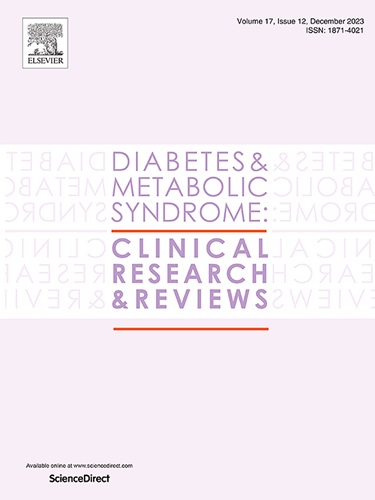Sex-specific dietary patterns and their association with metabolic syndrome: Insights from a cross-sectional analysis
IF 3.4
Q1 ENDOCRINOLOGY & METABOLISM
Diabetes & Metabolic Syndrome-Clinical Research & Reviews
Pub Date : 2024-09-01
DOI:10.1016/j.dsx.2024.103123
引用次数: 0
Abstract
Aims
This study aims to identify a posteriori dietary patterns with a sex approach and to evaluate their association with metabolic syndrome criteria.
Methods
Cross-sectional study conducted in 6821 men and women between 55 and 75 years of age. Forty-two food groups were analyzed from dietary information collected with food frequency questionnaires, using principal component analysis and cluster analysis and then information from both statistical methods was compared. Prevalences were calculated foreach cluster group, based on the number and types of metabolic syndrome criteria they met.
Results
Following principal component analysis, two dietary patterns labeled “healthy” and “unhealthy” were identified in both men and women, due to the presence of foods that are considered more or less healthy. These same dietary patterns were found in cluster analysis plus an “intermediate” cluster consisting of both healthy and unhealthy foods. The presence of metabolic syndrome is related to the “healthy” dietary pattern in women and to the “unhealthy” dietary pattern in men. Comparison of the two statistical approaches showed a high level of correlation between them (weighted Kappa = 0.703 in women and weighted Kappa = 0.691 in men).
Conclusions
Adherence to both healthy and unhealthy dietary pattern appears to be related to the development of MS. The differences found by sex make it necessary to develop interventions with a sex-specific approach.
性别饮食模式及其与代谢综合征的关系:横断面分析的启示
方法 对 6821 名 55 至 75 岁的男性和女性进行横断面研究。利用主成分分析法和聚类分析法对通过食物频率问卷收集到的膳食信息中的 42 个食物组进行了分析,然后对两种统计方法得出的信息进行了比较。根据符合代谢综合征标准的数量和类型,计算出每个聚类组的患病率。结果经过主成分分析,在男性和女性中都发现了两种饮食模式,分别标注为 "健康 "和 "不健康",这是因为存在被认为更健康或更不健康的食物。在聚类分析中也发现了这些相同的饮食模式,外加一个由健康和不健康食物组成的 "中间 "聚类。代谢综合征的出现与女性的 "健康 "饮食模式和男性的 "不健康 "饮食模式有关。两种统计方法的比较显示,它们之间存在高度相关性(女性加权 Kappa = 0.703,男性加权 Kappa = 0.691)。由于性别差异,有必要制定针对不同性别的干预措施。
本文章由计算机程序翻译,如有差异,请以英文原文为准。
求助全文
约1分钟内获得全文
求助全文
来源期刊

Diabetes & Metabolic Syndrome-Clinical Research & Reviews
ENDOCRINOLOGY & METABOLISM-
CiteScore
22.90
自引率
2.00%
发文量
248
审稿时长
51 days
期刊介绍:
Diabetes and Metabolic Syndrome: Clinical Research and Reviews is the official journal of DiabetesIndia. It aims to provide a global platform for healthcare professionals, diabetes educators, and other stakeholders to submit their research on diabetes care.
Types of Publications:
Diabetes and Metabolic Syndrome: Clinical Research and Reviews publishes peer-reviewed original articles, reviews, short communications, case reports, letters to the Editor, and expert comments. Reviews and mini-reviews are particularly welcomed for areas within endocrinology undergoing rapid changes.
 求助内容:
求助内容: 应助结果提醒方式:
应助结果提醒方式:


